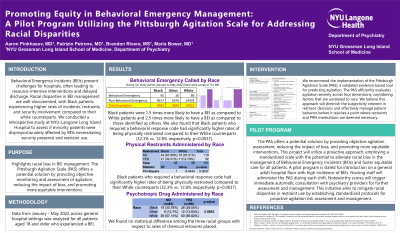Diversity, Equity, and Inclusion
(075) Promoting Equity in Behavioral Emergency Management: A Pilot Program Utilizing the Pittsburgh Agitation Scale for Addressing Racial Disparities.


Brandon Rivera, M.S.
Medical Student
NYU Grossman Long Island School of Medicine
Mineola, New York
Maria Bower, n/a
Medical Student
NYU Grossman Long Island School of Medicine
Mineola, New York
Aaron Pinkhasov, DFAPA, FACLP
Chairman, Department Of Psychiatry NYU Langone Hospital—Long Island Professor of Psychiatry and Med
NYU Langone Hospital—Long Island
Mineola, New York- PP
Patrizio Petrone, MD, PhD
Director of Surgical Academic Administration
NYU Langone Hospital - Long Island
Mineola, New York
Presenting Author(s)
Co-Author(s)
Background/Significance: Behavioral Emergency Incidents (BEIs) present challenges for hospitals, often leading to resource-intensive interventions and delayed discharge. Racial disparities in BEI management are well-documented, with Black patients experiencing higher rates of incidents, restraints, and security involvement compared to their white counterparts. We conducted a retrospective study at NYU-Langone Long Island Hospital to assess if minority patients were disproportionately affected by BEIs necessitating security presence and restraint use.
Methods: Data from January to May 2022 across general hospital settings were analyzed for all patients aged 18 and older who experienced a BEI.
Results: Black patients were 1.5 times more likely to experience a BEI compared to Whites and 2.5 times more likely compared to other ethnic groups. Additionally, Black patients with a behavioral response code had significantly higher rates of physical restraint usage compared to Whites (32.3% vs. 12.8%, p=0.0037).
Discussion: These findings emphasize the existence of racial disparities in the utilization of restraints, underscoring the necessity for objective assessment tools. To address this issue, the Psychiatry Equity Team recommends the implementation of the Pittsburgh Agitation Scale (PAS), a validated and evidence-based tool for predicting violence. The PAS efficiently evaluates agitation severity across four dimensions, taking into account factors that are unrelated to race. Our hypothesis suggests that this proactive approach will diminish the subjectivity inherent in restraint decisions and effectively manage patient behavior before it reaches a point where restraints and PRN medications are deemed necessary.
Intervention: A pilot program is slated for introduction on a general adult hospital floor where behavioral emergency incidents occur frequently. Nursing staff will administer the Pittsburgh Agitation Scale during each shift. Noteworthy scores will trigger immediate automatic consultation with psychiatry providers for further assessment and management. This initiative aims to mitigate racial disparities in restraint use by establishing standardized protocols for proactive agitation risk assessment and management.
Conclusion/Implications: This project will utilize a proactive approach, employing a standardized scale with the potential to alleviate racial bias in the management of behavioral emergency incidents and foster equitable care for all patients.
References:
- Nicks BA, Manthey DM. The impact of psychiatric patient boarding in emergency departments. Emerg Med Int. 2012;2012:360308.
- Gunawardena R, Smithard DG. The Attitudes Towards the Use of Restraint and Restrictive Intervention Amongst Healthcare Staff on Acute Medical and Frailty Wards-A Brief Literature Review. Geriatrics (Basel). 2019;4(3):50.
- Thomann S, Zwakhalen S, Richter D, Bauer S, Hahn S. Restraint use in the acute-care hospital setting: A cross-sectional multi-centre study. Int J Nurs Stud. 2021 Feb;114:103807.
- Rosen J, Burgio L, Kollar M, et al. The Pittsburgh Agitation Scale: A User-Friendly Instrument for Rating Agitation in Dementia Patients. Am J Geriatr Psychiatry. 1994 Winter;2(1):52-59.
- Pinkhasov A, Hallo C, Avishai A, Akerman M, Brand DA. Toward prevention of behavioral emergencies in a general hospital insights from a one-year series. Gen Hosp Psychiatry. 2020;66:54-58.
Presentation Eligibility: Not previously published or presented.
Diversity, Equity, and Inclusion: This study highlights racial bias in BEI management. The PAS offers a potential solution by providing objective agitation assessment, reducing the impact of bias, and promoting more equitable interventions.

